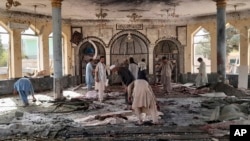A suicide blast inside a crowded Shiite Muslim mosque Friday in Afghanistan’s northeastern Kunduz province killed at least 46 worshipers and injured more than 150 others.
Taliban government spokesman Zabihullah Mujahid confirmed the casualty toll to local Afghan media, saying the attack took place in the provincial capital, also named Kunduz.
Islamic State Khorasan Province (IS-Khorasan), the Afghan affiliate of Islamic State, claimed its suicide bomber carried out the attack and warned of more such actions, according to a translation by the SITE intelligence group, which monitors terror groups’ websites.
The United Nations tweeted that it was “deeply concerned” by reports of “very high” casualties in the attack.
“Initial information indicates more than 100 people killed and injured in a suicide blast inside the mosque,” the U.N. Assistance Mission in Afghanistan tweeted.
U.N. Secretary-General António Guterres condemned what he said was a horrific attack, his spokesman said in New York, noting this was the third assault against a religious institution in less than a week. “Attacks that deliberately target civilians exercising the right to freely practice their religion are violations of fundamental human rights and international humanitarian law. The perpetrators must be brought to justice,” said Stéphane Dujarric.
Mujahid said Taliban forces were at the site and an investigation was underway. He gave no further details.
IS-Khorasan also was behind Sunday’s suicide bombing of a main mosque in Kabul.
That attack in the center of the Afghan capital killed at least eight people. IS-Khorasan claimed responsibility for it, saying a number of Taliban members were among the dead.
The terror group has taken credit for carrying out other deadly bombings in recent days against Taliban fighters in Kabul and elsewhere in Afghanistan.
The Taliban regained power in August in Afghanistan after waging an insurgency against U.S.-led forces in Afghanistan for 20 years. But the Islamist group’s nascent government is now facing a challenge from IS-Khorasan.
The Taliban said earlier this week that their security forces have launched an operation against IS-Khorasan bases, destroying one of them in Kabul and capturing at least 15 members of the group.
Afghan media quoted Mujahid on Thursday as downplaying the threat posed by IS-Khorasan, vowing Taliban forces will soon suppress it.
“We don’t call Daesh a threat, but we call it a headache,” Mujahid said, using a local acronym for IS-Khorasan. “It creates headaches in some places but is immediately taken out in every incident; (they) have been chased out and their sanctuaries found,” the TOLO news channel quoted the Taliban spokesman as saying.
VOA National Security Correspondent Jeff Seldin and U.N. Correspondent Margaret Besheer contributed to this report.









